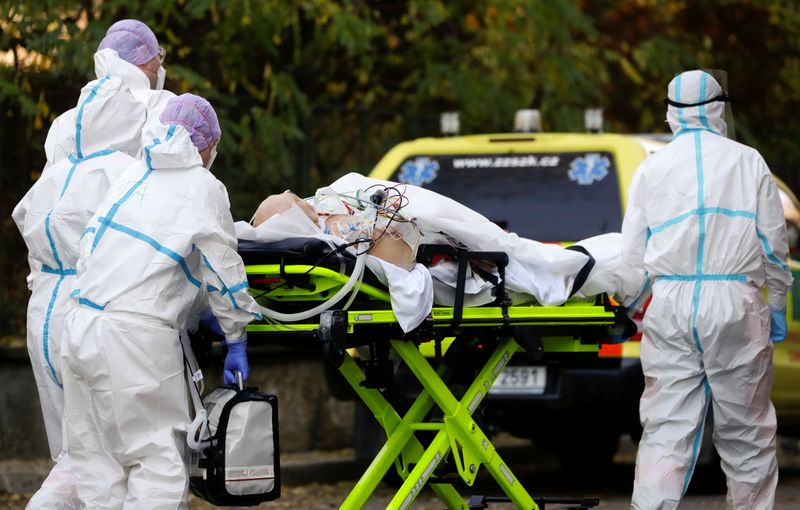PRAGUE (Reuters) – The Czech Republic has asked Germany, Switzerland and Poland to take in dozens of COVID-19 patients as the situation in its own hospitals has reached a critical point, Prague’s Health Ministry said on Friday.
The country of 10.7 million has been one of the hardest-hit globally, especially in recent weeks.
Many regional hospitals, overwhelmed by the inflow of coronavirus cases, have had to transfer patients elsewhere but these options have narrowed as capacities have thinned across the country.
“The large number of newly infected patients has intensified pressure on the healthcare system, and the number of patients requiring hospitalisation is growing,” the ministry said.
As of Friday morning, there were 8,153 COVID patients hospitalised, including 1,735 requiring intensive care, Health Ministry data showed.
“In some regions, the hospitals have exhausted their capacity and they are no longer able to provide appropriate care or to accept new patients without help from others,” Health Minister Jan Blatny said.
He said the government has given the go-ahead to seek dozens at least of hospital beds abroad, following offers from the three countries. Actual patient transfers are to be organised upon requests from hospitals, he said.
Across the country, just 13% of the overall intensive care capacity was free, including beds intended for COVID-19 and all other patients, despite hospitals having halted all non-urgent procedures.
The badly affected Karlovy Vary region on the border with Germany has started preparing for transfers, which may begin next week, CTK news agency reported.
The country has reported 21,325 coronavirus deaths and 1.3 million infections.
On Monday, the government closed more shops and banned movement between districts for anything other than work purposes, and it ordered regular testing at companies.
A number of hospitals have declared a “mass casualty event”, meaning not all patients may get the standard of care they would normally receive.
In one hospital that has declared an emergency, in Mlada Boleslav, home to car maker Skoda Auto north-east of Prague, the main problem was lack of staff.
“The numbers have started to grow over the capacity, mainly in terms of nurses,” said Jan Dudra, deputy director at the hospital. “Under normal circumstances, we have two nurses per 10 patients, today the situation is such that we have 15 patients and one nurse to take care of them.”
(Reporting by Robert Muller; Editing by Kevin Liffey and Hugh Lawson)























